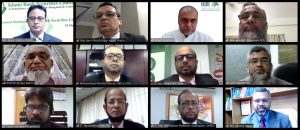Speakers at a roundtable on Sunday emphasised the need for not mixing up politics with business and business with politics.The people blames for the major incidents particularly in the garment sector escaped their responsibilities due to politicisation of business. They even remain out of the purview of the justice, they observed.
Addressing the roundtable on “Garment sector of Bangladesh: prospect, problems, challenges and way out” in the city they called upon all concerned to forge a national unity to resolve the existing problems in the garments sector instead of doing politics with crises in the garments sector.
Minister for Civil Aviation and Tourism Muhammad Faruk Khan, who addressed, the function as the chief guest expressed his optimism that the United States would withdraw its decision to suspend GSP facility on Bangladesh within six months.
“We are concerned over the US suspension on Generalized System of Preferences (GSP) facility from Bangladesh. The US action created problems instead of providing assistance. We hope we would get the GSP facility within six months,” he said.
The Minister emphasised the need for resolving the existing problems facing by the garments sector by taking a coordinated effort.
He said the government has formed a cabinet committee led by the Minister for Textile to look into the problems in the garment sector and make recommendations to resolve those.
Faruk Khan said the government during its four and half-a-year in office increased the wage of garments workers up to 82 per cent. It is now thinking to increase their wage again, he added.
The Minister called upon the garments workers to be cautious so that they are not used for damage of country’s wealth make it a victim of other competitors.
The roundtable was organised by Shippers’ Council of Bangladesh (SCB).
Dr Khondaker Golam Moazzem, additional research director of Centre for Policy Dialogue made a power point presentation on crisis and competitiveness in the RMG Sector of Bangladesh: How to address the challenges?
The function was also addressed, among others, by Atiqul Islam, president of BGMEA, Prof Abdul Mannan, adviser, Board of Trustees, ULAB, Farid Ahmed Chowdhury, former president of CCCI, DR Naznin Ahmed, senior researcher fellow of BIDS, Ashif Ibrahim, Dr MM Akash, Dr Tuhin Malik, Badiul Alam Majumder, Md Rezaul Karim, senior vice president of SCB, Shirin Sultana, workers’ leader and Nazma Akhter, a garments worker.
BGMEA president Atiqul Islam said the garments business in Bangladesh now is under threat as the buyers have been shifting to other countries and competitor countries creating infrastructure for their garments factories.
He called upon the government to provide lands to shift the vulnerable garment factories to protect the country’s greater interests.
When the interest rate of in the banks is 18 to 19 per cent and the cost of land is very high, how the garments factory could be shifted without the help of government, he questioned.
Referring to the contribution of the RMG sector to different service sectors including, bank, insurance, transport and housing, he said all should come forward with hands of cooperation during the crisis period.
The BGMEA leader said they would welcome trade unions in the garment sector if it is formed lawfully and work in constructive manner.
Regarding GSP suspension by the US, he said the country is the victim of conspiracy.
He hoped that the RMG sector would be able to reach the business from the current USD 20 billion to USD 50 billion by 2021.
In his keynote presentation, Dr Khondaker Golam Mostafa said social compliance in the garments sector was improved but the social and psychical compliance were not proved at that rate.
There are enough laws and rules to ensure facility of the garments workers but those are not implemented, he added.
He emphasised the need for improving the standard of labour saying that there is no alternative to it for development.
Golam Mostafa said though there are many endeavours in the garments sector there is lacking of coordination.
Prof Abdul Mannan said incidents were taken place in the developed countries but they tried to take lesson from those but Bangladesh doesn’t take lesson from incidents like Rana Plaza collapsed.
Farid Ahmed Chowdhury said if the trade union engages in tailism, mthe garments won’t sustain for two years and a month.
Dr Naznin Ahmed said this is right time to negotiate with buyers to ensure welfare of the garments workers.
Nasiruddin Ahmed Chowdhury, Chairman of SCB, who delivered the address of welcome, said Bangladesh is now going to be turned into a meddle income country depending on the garments sector.
The garments sector has a huge contribution in export earning, employment generation and empowerment of women, he said.
The SCB leader said some people dream that Bangladesh, the second largest garments export country, would obtain the first position in near future.
– Staff Reporter




